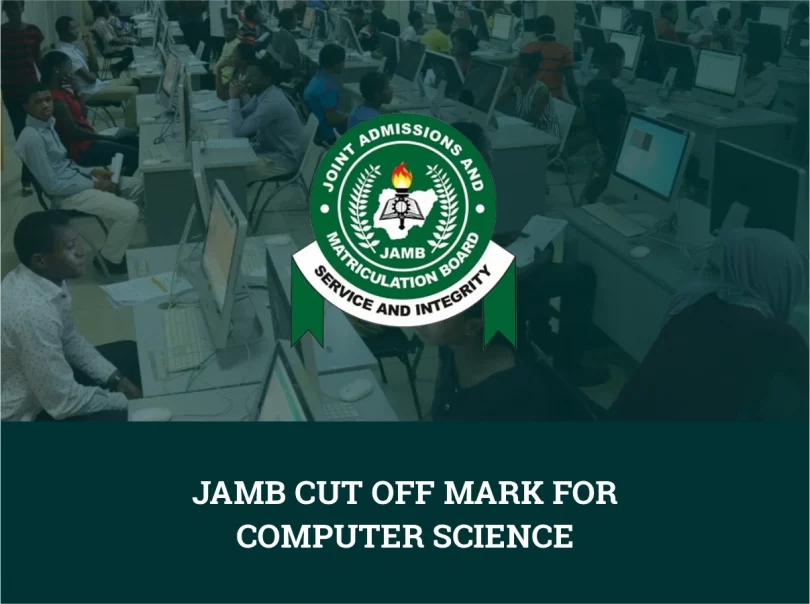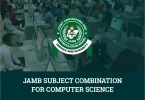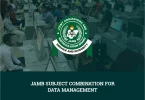Good news to all JAMB candidates, JAMB has released the cut-off mark for all courses for both universities and polytechnics. Did you choose Computer Science as your course of study when you registered for JAMB? If yes, then this page is specially for you. It is believed that candidates may have checked their JAMB results after the release of the exam results.
One thing is to check your JAMB result after sitting for the exam; another, most important thing is to know if the score has met the benchmark for your desired course of study. If you do not know the JAMB Cut Off Mark for Computer Science and you have chosen this course as your course of study, we urge you to read this page carefully to discover this information.
UTME candidates who choose Computer Science as their preferred course of study can now check the UTME cut-off mark for Computer Science, as it has officially been released.
We have accurate information on the JAMB cut-off mark for Computer Science and the list of Universities that have also released their cut-off marks for Computer Science.
What is the JAMB Cut Off Mark for Computer Science?
The Joint Admissions and Matriculation Board (JAMB) has set the general minimum cut-off mark for admission into Nigerian universities at 140 and that of Polytechnics at 100 for the 2026/2027 academic session. However, Computer Science is a highly competitive course, and most universities set higher cut-off marks for it.
Generally, the JAMB cut-off mark for Computer Science ranges between 180 and 250, depending on the institution and its admission policies. Some institutions may accept scores as low as 150, while others may require scores above 200.
Mark does not guarantee admission, as universities may have additional requirements and limited slots. Therefore, aspiring Computer Science students should aim for higher scores to enhance their chances of admission.
List of Universities that have Released their Cut Off Marks for Computer Science
Here is a comprehensive table of Nigerian universities that have released their JAMB cut-off marks for Computer Science for the 2025/2026 academic session:
| University | JAMB Cut-Off Mark for Computer Science |
|---|---|
| University of Ibadan (UI) | 70.75% aggregate score |
| Federal University Lokoja (FUL) | 62.00% aggregate score |
| Lagos State University (LASU) | 200 |
| Lagos State University of Science and Technology (LASUSTECH) | 180 |
| Kano University of Science and Technology (KUST) | 170 |
An Overview of What to Expect from the Field of Computer Science as a Student
The field of Computer Science is a dynamic and ever-evolving discipline that encompasses the study of computers, computational systems, and the principles behind software and hardware development.
As a student or aspiring professional in this field, you can expect to engage with a wide range of topics that equip you with both theoretical knowledge and practical skills applicable across industries. Here is an overview of what to expect from the field of Computer Science:
Dynamic and Evolving Discipline
- Computer Science involves the study of computers, computational systems, software, and hardware development.
- The field is constantly advancing with emerging technologies.
Core Focus Areas
- Emphasizes problem-solving through algorithms and data structures.
- Includes extensive training in programming languages such as Python, Java, C++, and JavaScript.
Specializations and Subfields
- Artificial Intelligence and Machine Learning
- Cybersecurity
- Software Engineering
- Databases and Data Management
- Networking and Cloud Computing
- Human-Computer Interaction
Academic Foundations
- Strong emphasis on logical reasoning and mathematical thinking.
- Common coursework includes discrete mathematics, computational theory, and systems analysis.
- Hands-on experience with industry tools and software development environments.
Career Opportunities
- Wide range of roles including software developer, data scientist, cybersecurity analyst, IT consultant, systems architect, and more.
- Employment opportunities across various industries: finance, healthcare, education, entertainment, and government sectors.
Skills Developed
- Critical thinking, creativity, analytical skills, and adaptability.
- Ability to innovate and solve real-world problems using technology.
We hope this article has been of great help to you. Let us know your thoughts in the comment section below.







Leave a Comment